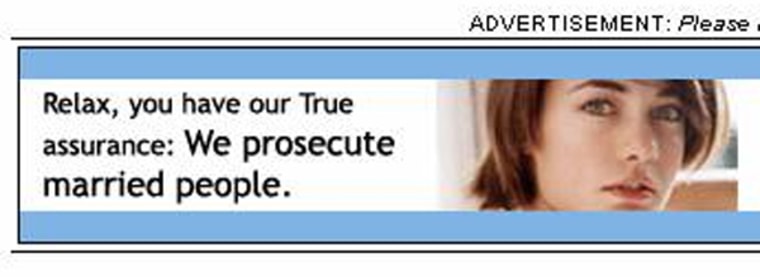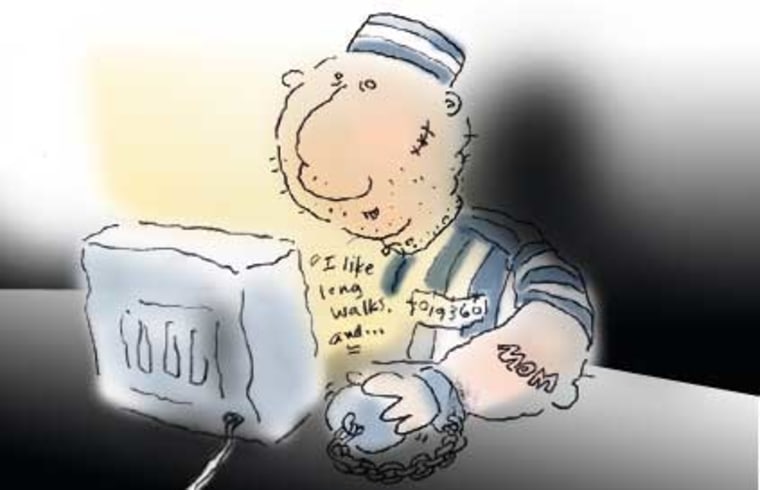Criminal background checks aren't just for Little League coaches and church volunteers any more. Now they are another way to vet prospective online dates.
Earlier this year, online dating upstart True.com announced it would use technology to protect members from flirting with felons. New members must submit to criminal background checks, and if they fail the test, they're out. The site also plans to add systematic screening for marital status soon.
"I wanted to provide a wholesome environment for courtship," says CEO Herb Vest, who actually met his wife on a blind date. "There are a lot of predators in this world. The first thing to do is to screen out people who are married and ex-felons."
While explosive growth in the industry has slowed, online dating sites remain one of the most lucrative categories in e-commerce, and new entrants like True, formerly TrueBeginnings.com, continue to flood the Internet. Jupiter Research says some 30 million Americans now peruse online dating sites, and they spend close to $400 million looking for love online. True, which opened in November, now claims it has half a million members.
"Relax. ... We prosecute married people ... and we screen for felons. That means True singles are who they say they are. Date with confidence," Web ads for True.com say.
Rival blasts 'false sense of security'
That description, and the service itself, bugs Tim Sullivan, president of competitor Match.com. His company has considered and rejected the idea of criminal background checks.
"We are very cautious about implementing something that is incomplete. [It] could lead members to develop a false sense of security," Sullivan said.
Nationwide criminal conviction databases are incomplete and clever criminals could easily evade the system by signing up with a false identity, Sullivan says.

"It is incredibly dangerous, and we are quite upset that somebody in the category is attempting to communicate to anyone that they are truly safe on their online dating service. ... If someone claims a community that's 100 percent free of people with bad backgrounds, of people who are not who they say they are, they are deceiving users," he says.
Vest concedes the service isn't perfect, but thinks it's a good start -- particularly in an industry that's still beating back a perception that online dating is rife with people who misrepresent themselves.
"It's possible someone could get through our system, but it does give you some assurance the person is not an ex-felon," Vest says. "In addition, we also require members to sign a code of ethics that they will treat other members with respect. We're out to clean up the industry."
To back this point, True is actively supporting a bill introduced last week in the Texas state legislature than would require dating services to implement criminal background checks.
Match.com's Sullivan argues that tales of online dating nightmares are overblown, dismissing True's marketing campaign as "cheap scare tactics." Still, he says Match is considering its own enhancements to reassure users that potential mates are on the up and up. One that's already been test-marketed is verification of member photos, to deal with frequent complaints that online suitors use old and overly-flattering images in their profiles, leading to much first-date disappointment.
Meanwhile, the two dating services are in the middle of a messy public dispute. Match, which is owned by Barry Diller's InterActive Corp., recently subpoenaed 6 True employees who formerly worked at Match.com. Match says it is investigating possible breach of contract and theft of trade secrets. True responded by taking out a full-page advertisement in the Wall Street Journal that called the move a "blatant effort to intimidate these six individuals."
While True.com doesn't explicitly charge for its background check, the price is built into the subscription fee for the service -- $29.95 a month, a bit more than competitors Match.com and Yahoo! Personals. Yahoo representatives didn't immediately return phone calls for this story.
175 million criminal records
How does True conduct its background checks? Welcome to the mysterious world of database-driven decision making -- a world potential daters likely wouldn't know, unless they've applied for a job recently.
True uses Investigation Technologies' Rapsheets.com to do the vetting, a firm recently acquired by database aggregator ChoicePoint. ChoicePoint, a spin-off of credit reporting agency Equifax, supplies insurance firms with background information on everything from car accidents to home water damage claims, helping the insurance industry set premiums. ChoicePoint also offers its own criminal background check service.
Rapsheets' spokeswoman Camile Gamble says the company has a vast database of over 175 million criminal convictions, both felonies and misdemeanors. Only felons get kicked off True's service, but those wishing to dig deeper can contact ChoicePoint or Rapsheets on their own to find out about DUI tickets, and in some cases, even minor offenses, for about $20 a pop.
The sites aren't complete -- several jurisdictions refuse to sell their conviction data -- but Gamble figures about 94 percent of all felony convictions nationwide are in the firm's database. The information dug up by Rapsheets is public; consumers generally could visit their local county courthouse and ask for it. But the advantages of searching a big national database are obvious.
"The other option is to to hire a county runner to go to each county courthouse to go where each person has lived, at $25 to $40 a pop," Gamble says. And often, that doesn't ferret out a criminal background anyway. "Criminals will get around letting you know that they have lived in a county."
Most of Rapsheet's customers are pre-employment screening staffing companies, she says, but the firm has a big non-profit division as well: Little League Baseball and the Catholic Archdiocese of Chicago also use it.
Starting from paranoia
The dating scene is a new venture for Rapsheets. The firm doesn't make decisions on who gets to use True.com; its database just returns a "hit" when someone appears to have a past conviction. True then gives the potential member a chance to challenge the accuracy of the record. About 11 percent of its applicants have been screened out by the service, True says.
Vest insists that a background check is a healthy way to start a courtship.
"It's there to protect those people who are not ex-felons, that's the reason we are doing it," he says. "For people who aren't ex-felons, there's no invasion of privacy, there's no reason not to do it."
But perhaps there is, says online dating expert Liz Kelly, author of the book "SMART Man Hunting."
"I think it's a little extreme as a basic service," Kelly says. "It adds a level of paranoia that is going to add tension before you even meet. That level of paranoia is not a good way to start a relationship. Everyone has a past. You don't want to get into talking about the past until you start getting more serious."
Common sense measures, like meeting in a public place, should offer the necessary protection until a relationship gets to that point, she says. Then, if some things aren't quite measuring up, a background check might be one tool to use.
"I think the most important thing is you need to trust your gut in the beginning of a relationship," Kelly says. "And you can find out a lot about somebody just using Google. That's what I tell people. I'd do that before I spent money on a background check."
